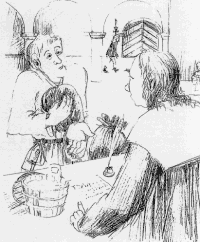Meet the Middle Ages
BackTaxes

Peasants who owned their farms paid taxes to the Crown. Tenant farmers paid a fee to the owner of the land, to a nobleman or a monastery. A citizen paid tax to both the Crown and the town. Noblemen were exempt from tax in exchange for taking part in the defence of the country. Priests, who conducted services and took care of the souls of his parishioners, did not have to pay any taxes either.
Both the town and the Crown needed money to repair buildings, to employ people, for defence and so on. All citizens had to pay a small fixed tax to the town. Everyone had to pay tax on their property as well. A rich person had to pay a lot, but a poor person could be exempt from tax altogether.
Merchants often became very rich from trading. Therefore, there was tax on trade. The largest profits made by the town and the Crown came from these duties. One had to pay duty on all goods which was brought in and taken out of town.
The Crown also received part of all fines which criminals were sentenced to pay. Most tax in towns was paid in cash. The peasants also paid their taxes with farm produce such as grain, butter, meat or fish.